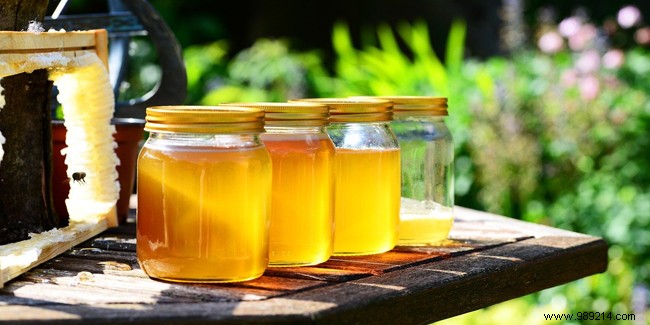
Already in Antiquity, honey had its letters of nobility. The ancients had understood that it had countless virtues in terms of health and cosmetics in particular. Made by bees with the nectar of flowers, honey is the natural product par excellence, rich in energy. As food, it is more easily assimilated by the body. Review of some benefits of honey among its 1001 virtues.
No more praising the benefits of antioxidants on our body! These substances (bioflavonoids, carotenoids, vitamins C and E, selenium) indeed constitute real barriers against the harmful effects of free radicals which attack our cells with the consequence of making them age and promoting appearance of certain diseases such as heart disease, stroke, Alzheimer's disease, cataracts and certain cancers.
The body naturally produces antioxidants. But, with age, this production deteriorates. This is why it is necessary to supplement these natural contributions with antioxidants, particularly present in food. Honey, precisely, has the advantage of containing in particular flavonoids such as fruits, vegetables or cereals. The antioxidant content of honey varies in particular according to the flowers that are part of its composition. Generally speaking, dark colored honeys contain more of these substances than light colored honeys.
Honey is recognized for its prebiotic effect, that is to say that it contains substances that protect and above all help the colon to function well. It has the virtue of playing a beneficial role in the balance of the intestinal microflora by stimulating the activity and life of the bacteria necessary for the proper functioning of our intestines. Honey is thus a good remedy against digestion problems, constipation or even stomach pain.
Due to its low pH and low protein content, honey plays a significant role on bacteria. It prevents them from settling in the body and proliferating. Thus, honey is a good antibacterial and it has benefits in particular on inflammations that affect our digestive system such as gastric ulcer for example. These characteristics also make honey a good ally to strengthen our immune defenses.
Its antibacterial power, but also antiseptic, also has positive effects on a wound or a burn. Applying honey to the damaged skin first helps relieve pain, but above all helps the skin to heal faster.
In case of cough, honey is also a good remedy. A mixture composed of this natural product and lemon makes it possible to obtain a very effective homemade syrup.
Among the 1001 virtues of honey, that of containing little sugar compared to its high sweetening power is an advantage especially for people who suffer from obesity, hypertension or diabetes. The low glycemic index (criterion which classifies foods containing carbohydrates according to their effects on the blood sugar level, that is to say the level of glucose in the blood) of honey allows these people to be able to continue to eat in particular sweet but in reduced proportions and completely natural.
Honey has sedative properties, that is to say calming, and helps in particular to fight against insomnia. Consumed in herbal tea, orange blossom, lime blossom or clover honey in particular, allows you to fall asleep more quickly and not wake up at night.
Honey has more than just nutritional benefits. Used as a cosmetic, it is also a very good moisturizer for the skin. For example, you can mix it with a little olive oil and add it to your bath water for more supple skin.
Honey also has benefits for acne-prone skin thanks to its regenerating properties in particular.
If you want to take advantage of the countless virtues of honey, you have to choose it well. Indeed, many honeys, most often sold in hypermarkets and imported from China (leading exporter of honey), no longer have anything to do with this 100% natural product because additives, preservatives, syrups of sugar, etc.
The production and sale of honey are regulated in France. Thus, this natural product must meet well-defined characteristics to ensure its quality. Its labeling must, for example, mention its country of origin. The indication of the flowers with which the bees produced the honey is also a good quality criterion. But, to be sure to buy quality honey, it is preferable to buy directly from a beekeeper, if possible organic, in order to be sure of its origin and its composition.